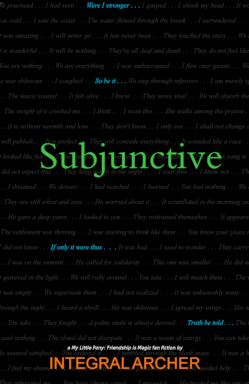
Epilogue
This concludes the narrative. These memoirs of this unhappy creature, from his birth to his end as he was, in which he pursued happiness but attained only simulacra thereof, are over.
I must leave him there, on the sand, as the surf washes over his emaciating body, and my last sight of him is his decrepit eyes, contemplating with various degrees of attraction and repulsion the scavenging birds of prey. Will his dignity get the better of him as it had so many times before? Will he starve to death? Or will he admit to himself this one lowering on his moral mountain, an escarpment he now sees to be full of fissures and hollows? Will he lower himself in order that he may become rejuvenated and ascend that mountain with newly-built tools?
These are not questions for me to answer. I leave him.
I have shown his abuses and pains and sorrows and hatred. In this moment in time, as he lays in this dying agony, I permit him his privacy. Let him die or live; let him think or evade. It is not my place to intrude in this period of time, when I have intruded so many times before. There are some deliberations of the soul that would not be proper to show.
Through the course of this narrative, I’ve endeavored to depict its central figure not as a sublime hero, not as an abject villain—but him as he was and how he ought to have been. I have not eschewed his vices, his villainies, or his immoralities in order to unjustly aggrandize a wretched figure; I have not omitted his benevolences, his kindnesses, his good wills, or his sincerities in order to pound further into the dirt this already downcast creature.
So I say to you now: there he was; there he is—take him as a whole. You have the information. May you judge upon his character in the way you see fit. But let him be. Do not try to pry further. Permit him this one concession.
Every word you have just read and the order in which you have read them, save for a few pieces of dialogue here and there, are the words and order that I myself, the author of these memoirs, have employed to recreate those dreadful days. That is to say, the words are not translated from a different language; nor were they as mental concepts dictated to another to translate; nor had I conceived them in one language and wrote them down in another. The words as you’ve seen them are as they were brought forth from the womb of my mind, and no veneer, no facade, obfuscates them to you. If anywhere you see a profundity in the text, a defect, a lucid exposition, or a murky soliloquy, know that those were the original, untainted words, the integrity for which no translator may be praised or blamed.
The study of language and the knowing of languages has given me irrevocable perspective. But, in the writing of this, I have used only the one—and, indeed, if you take my introspection as truth, none other ever occurred to me. Though I love all languages, and think that they are all majestic in their own way, this shall always be my language of choice: I’ve seen the cultures of the world, heard their languages, have a working knowledge of most of them, and I tell you that this one is the most exact, mathematical, rigorous, beautiful, streamlined, and august extant language. It is no surprise to me that this is the language of the most prosperous society on the planet and the universally recognized language of work and productivity.
When I conceived of the idea for this memoir, naturally, the question arrived as to what narrative frame it should assume—namely, concerning its principal character, do I, the writer, speak about him or through him? Originally, I’d chosen the former. But it was shortly after the chapter in which he acquires his name that the narrative took a term for the worst. I found that I stopped believing his emotions, his motivations. Every time he and others spoke his name, it seemed improper. I didn’t know how to refer to him in the latter parts of the narrative. And then he appeared to me as he had tried to appear to the world—nothing more than a facade.
I realized that this original narrative frame was vanity. I’ve distanced myself from him, yes, but I can’t ignore who I once was, nor can I be permitted to forget him. I would only doom myself to a life of perpetual confusion and ignorance—and this would be a pain in which a scientist could not find the will to live!
Hence the narrative frame. He was I. I was he. I remember him not out of sentimentality but out of a warning to myself. It is only in this way that I may be able to rid myself of him. But maybe now, after writing this, I can at least say that I was he, past, and now I am I, present.
Though the principal recounting is done, this dark romance of my earlier years concluded, I’m fain to mention a certain event which you may find interesting if for no other reason than to appreciate those oddities that every so often reach out and touch upon the lives of the ordinary and melancholy, elevating their moods if only in passing, such that, just for a moment, they may smile.
*
In the heart of Ponyville sits a large oak tree. It is hollowed out from its trunk to its bough, the former having been converted into a space suitable for habitation and the latter into the foundation for a few balconies. In the day, a great deal of sound and activity makes its way out from the seclusion of the tree. Even late at night, lights can be seen coming out from the glass windows installed in its hollowed-out knots.
On a clear day, the sun approaching the zenith, the attack on Canterlot having settled vaguely into the memories of Equestria’s citizens long before, there could be seen three ponies, three different shades of color, through the window on the ground floor, as it were, of this tree. There was Twilight Sparkle, the tree’s superintendent; Pinkie Pie, her friend, whom the former called to help with a certain task she needed dire assistance in the execution thereof; and a third pony, a newcomer, whom neither of the preceding two had ever seen before.
The floor was covered in books. Twilight Sparkle, with quick, agile steps, leaped across the piles, occasionally stumbling when she couldn’t immediately find a place where she could land without harm. Occasionally, Pinkie Pie would appear from the depths of the piles shortly before submerging once again, her head, literally, in between the pages of a translation of Half of a Million Cables beneath the Ocean. This edition had a picture of an impeccably carved statue of the goddess Mare. The statue shown, of course, wasn’t the original, but rather a copy that was displayed in a glass case in a museum in Canterlot. Though the original sat exposed to the air on a pier in Fillydelphia, disfigured nearly beyond recognizability, it was commonly thought that the museum piece with the sparkling hooves tipped with whitecaps and the clearly defined tempestuous mien strengthened by the posture of its perfectly formed body was the original.
“Sorry!” said Twilight Sparkle, turning nervously to the visitor. “You picked quite the day to come here! We’re changing the classification system today.”
The third pony said nothing. She stood in front of them, watching the other two in front of her dive through what appeared to her as complete disarray.
“What are you looking for?” said Twilight Sparkle, passing by the visitor once again on her way to a shelf. “I think Pinkie Pie pulled these books down in bunches, so these mounds here should roughly correspond to the different decimals. Maybe I can still find it. What are you looking for?”
“Yes,” said the pony, in a choking rasp.
Twilight Sparkle stopped and turned to her. The visitor’s accent and her strange enunciation of the syllable caught her off guard. It sounded almost as if she were uncomfortable with the language.
She stepped up to the newcomer and said, deliberately and slowly: “What book do you want?”
The newcomer gave a big, toothy grin. “Yes!” she squeaked. “Book!”
“Here,” said Twilight Sparkle. She levitated a card detailing the old cataloging system to the visitor. When she saw that the latter still did not understand, Twilight Sparkle, turning to her desk, drew a question mark on a notepad and showed it to the visitor along with the card. “Which book?”
“No, Twilight!” came a voice from beneath the floor. The book pile suddenly erupted in a wave, and out emerged Pinkie Pie. She fairly flew next to Twilight Sparkle and slapped down the card and notepad. “Don’t you know that speech is so-o much more fundamental than symbols? Look, like this!” And, turning to the visitor, she said: “Wha-at—kind—of—book—do—you-u—wa-ant?”
“Yes, yes!” said the visitor, her eyes lighting up with the unmistakable mark of comprehension. “Want . . . want book . . . for speak . . . learn.”
Twilight Sparkle turned an incredulous stare to Pinkie Pie. “See?” said the latter. “It’s all in the enunciation.”
Twilight Sparkle groaned and rolled her eyes, while her friend went back to her spelunking. She turned once more to the visitor, and drawled, complete with the emphasis and spastic gesticulations:
“Well, before anything, you need a lib-ra-ry card. I can get one for you, but I need your address.”
The pony cocked her head to one side. “No . . .” she said.
“Why not?” said Twilight Sparkle. “Just your address. See? I liv-e here.” She gestured to herself. “She, Pinkie Pie”—gesturing to her—“lives . . . everywhere, I suppose,” she continued, gesturing around.
She pointed to the visitor. “And yo-u live where?”
The newcomer pursed her lips, as though afraid to talk. Then, at length, she took a breath, and stuttered, in a tentative whisper: “El . . . shhh . . . on.”
Twilight Sparkle raised her brow and leaned an ear closer. “Sorry, I didn’t quite understand.”
“El . . . shhh . . . on.”
“Is that downtown?”
“Elision!” yelled Pinkie Pie.
“What?” said Twilight Sparkle.
“If a novelist, poet, playwright, orator, or anyone comfortable with his language should feel that a letter, syllable, or word can and ought to be omitted, be it for the sake of meter or ease of speaking,” said Pinkie Pie, in rapid-fire speech, “he can omit it, and the result is an elegant merging of two sounds into one consonant whole. It’s called an elision.”
Twilight Sparkle blinked. “How do you know that?”
Pinkie Pie looked up from her book. “It was under eee-eee!”
The visitor, noticeably agitated, stamped her hoof on the floor, instantly getting their attention.
“Leave . . . now,” she grumbled.
Twilight Sparkle started. “What was that?” she asked, dubiously.
“Leave . . . now,” the visitor repeated.
At that moment, there was a rap at the door. Twilight Sparkle excused herself from the guest with an uneasy sigh, trotted over, and greeted the visitor.
Before her stood another unfamiliar face. This was a unicorn, of unremarkable features, color, and height. But what struck Twilight Sparkle the most was not his face but rather how he adorned himself: His horn stuck through a small hole in the brim of a tall, black top hat. He wore a pince-nez, the chain of which dangled in front of his face, and his tongue continually engaged in a battle with it, trying to expel the intruder from the mouth. He was dressed in a black formal tailcoat, bound with a tie that nearly touched the ground. His off foreleg was limp and resting on an ivory cane.
Upon seeing Twilight Sparkle, he bowed. “Good day,” he said in a high, shrill voice struggling to be rich and deep.
The other newcomer, hearing the stallion’s voice addressed to Twilight Sparkle, balked, flattened her ears, tried to make herself inconspicuous, and moved toward the door.
Twilight Sparkle invited the stallion in. When the strange mare passed by him, she stopped, perked her ears up and stared at him for a marked amount of time. In the sight of him, her diffidence seemed to vanish in an instant: her pupils dilated, and she leaned closer and stared directly at him, saying nothing but continuing to gaze at him all the while. A silence pervaded the room; even Pinkie Pie stopped her rummaging.
“Good day,” whispered the stallion.
At length, the newcomer averted her gaze. She bent down, flattened her ears, and tried to creep away once again. She walked lugubriously and slowly, as though she had expected something in the stallion’s eyes but hadn’t found it.
“Welcome,” said Twilight Sparkle to him, as the mare drew away and slipped out. “I don’t believe we’ve met.”
“I’m new in town,” he said, “and I don’t believe I’ve had the pleasure of becoming acquainted with you and this . . . tree. It so drew my eye . . . where I used to live, we lived in trees too.”
“A pleasure, sir! This is my home and the library of Ponyville,” Twilight Sparkle responded, with a smile and a wave of her hoof. “Come and get a book whenever you’d like.”
“Whenever I’d like? That’s . . .” He paused, as he looked around at the shelves, and the piles of books, scrolls, and binders that littered the room. “That’s wonderful. I think I want to read . . . read till there’s nothing left, spend the rest of my life reading. I’m sure you’d know that desire, being the maintainer of the library . . .”
“Whatever subject you want, I have volumes on it.”
“I’ll need them, all of them. I’ll come here every day to see if your nonfiction section is yet rectified and ready for public use.”
“Delightful!” said Twilight Sparkle. “I’m too familiar with that jittery eagerness to dive into your studies! What are you researching while in Ponyville?”
“Science.”
“Which one?”
“All of them. But perhaps we can discuss this later when the matter of what kind of books I need is more important. Right now, I think I need a library card. I have an address—I have it written down here, bear with me—and so if you aren’t too busy, I’d like to—but what’s the matter? You look nervous.”
Twilight Sparkle was indeed shuddering. “It’s just . . . that mare who was here before you . . .”
“Oh?” The stallion did a double take. “Did something happen?”
“Before she left, just now, she said: ‘Leave . . . now.’ That’s all she said: ‘Leave . . . now.’ It was strange.” She shuddered. “It didn’t sound good.”
“Leave now . . .” the stallion muttered. “This mare,” he continued, after a pause. “How did she speak? I mean with an accent, or with a peculiar accentuation of syllables, or . . .”
“Almost not at all. I had to speak slowly, as though she didn’t understand.”
The stallion smiled. “Don’t worry then,” he said.
“I don’t understand.”
“You see, miss, your mother tongue influences the way you speak a second language. You’ll notice that students of a second language who have the same first language will make the same kind of mistakes when learning, but will make different mistakes as other students who have a different first language. I don’t know this mare, but I imagine her first language is one that permits the speaker to not explicitly specify a subject. She most likely just dropped the pronoun; I believe she meant to say ‘I leave now’ but didn’t understand the necessity of the I. Have no fear; I doubt she had any malicious intentions at heart.”
“Ah,” said Twilight Sparkle. “Is language your area of study?”
“Yes.”
“I’ve never heard a linguist say he studies all sciences.”
“We do,” he said. “Linguistics is where all of science meets. Do you want biology? Allow me to draw out for you a language family tree. Let me show you the diversity of the languages on this planet. I can show you where these languages come from, how they were born, how they survived, how they mated and mingled with others to adapt to a changing environment, how they died and went extinct and left their remnants with us today. Language death? Language extinction? Fossilization? Languages are born, die, and evolve over time, just like creatures. It’s no coincidence that we share many terms with the biologists. Want chemistry? What is a phoneme if not an atom? What is a word if not a molecule? What is an agglutinative language if not a polymer which stretches into infinite complexity? Want physics? Would you call me a physicist if I told you I studied and predicted the movement of entities that change and remain in forms determined by physical laws, and hypothesized new models of such movements? Yet what is this but studying and classifying language?”
Twilight Sparkle beamed and held out a hoof. “Well, pleased to meet a changelinguist then! Where did you study?”
The stranger grasped her hoof and shook it. “The pleasure is—” He stopped abruptly and recoiled from her, trembling all over. “What do you say?” he gasped.
Twilight Sparkle wrinkled her brow as though in consternation, as she shot him a peculiar look. “I only asked about your alma mater.”
“I studied . . .” stammered the stranger. “I studied . . .” Then, catching himself, he sighed. “Enough out of me,” he continued. “I want to ask you something.”
The stallion leaned on his cane, jumped, and pirouetted around it, more graceful than any ballerina, the tails of his coat whipping around him with a sharp lapping of the air.
“Look at me,” he said, pirouetting again. “How do I look? Does my appearance please you? Does it garner any positive connotations to your mind?”
Twilight Sparkle thought for a minute, then nodded with a smile. “Yes,” she said. “I like how you look.”
“And what about me exactly pleases you?”
“You dress as though you cared about your appearance and as though to emphasize and augment who you are and what you do. You value yourself highly; you value what you do highly; so you dress in a sophisticated style and carry your head high. I don’t miss many things about Canterlot, sir; but that appearance of pride is one of those things.”
At once, the stallion stopped his capering. His pince-nez fell from his muzzle, and he flattened his ears as though in shame.
“If that’s the case,” he said, “then I must be honest with you.”
He took a step closer to her.
“This?” he said, gesturing to himself from head to toe with his cane. “This isn’t real. This isn’t how I look. I put it on because I thought it would be pleasing to you. It’s nothing but a facade.”
He shuffled his feet on the ground and bowed his head, avoiding eye contact with her. “I look like a noble, talk like a scientist, when in reality I’m not really any of those things. I’m a parasite. In my earlier life, I’d hurt a lot of ponies with my facade. I’d hurt so many that no amount of repenting in my life could absolve me now. I’ve hurt, and I’m ashamed, yet I can’t die. I need to make amends. I have some duties I have to attend to, which I can’t evade. But I don’t know anything but how to wear a facade! I want to be noble; I want to be a scientist; I want to be moral—but I don’t know how to be any of those things; I know only how to pretend I’m those things. And I’m so good at it that I convinced you I was those things, yet I know I’m not inside. But how else? If you knew what I really was, you’d never let me have a chance!”
Twilight Sparkle put a hoof on the stallion’s shoulder. The touch animated him, removed the slouch in his spine, and he raised his head high once again. His eyes were red and glistening.
“Sir,” she said, “morality isn’t some abstraction that you can only strive toward with introspection. It isn’t something of the soul; it’s how you act. It’s how you treat others. You say that you’ve acted badly but now you want to be moral. Then why not start acting moral? Why not dress like a noble and talk like a scientist if that’s what you want to be? Being good is achieved through actions, not moralizing. Do what you think a good pony would do; self-satisfaction will follow.”
“Fake it till you make it!” said Pinkie Pie.
The stallion laughed and wiped his face with a handkerchief withdrawn from his breast pocket. He shuddered, as though shaking himself free of burden, and sighed a deep, sorrowful, and painful, but cathartic, exhalation.
“Thank you . . .” he gasped. “Thank you.”
He laughed, breaking the thick atmosphere and turning it lighthearted once more. “But let me not turn this center of peace and meditation into one of vociferations. I don’t believe I even have a library card yet.”
“And I’ll be happy to get that for you,” said Twilight Sparkle. “What will be the name on the card?”
“My name is—”
At once the stallion went silent, his eyes wide, his breath bated. He didn’t seem to be staring at anything in front of him; rather, it was as if he were looking inside, applying a part of his brain that had atrophied from a lack of use to the solution of a problem.
Twilight Sparkle, sifting through some books on her desk, didn’t notice this singular pause. When her attention once more came to him, again she asked: “What’s your name?”
The stallion’s eyes came to life. “My name?”
“Yes, for the card.”
“It’s . . .” He shrugged.
“Call me Star Buck,” he said at last.
Twilight Sparkle nodded and then proceeded to go over the terms of the library with him.
Some time later, he emerged from the library. Though the fresh air tasted of liberation, though the welcoming sky shone down its beams in benevolence, a great tremor stirred within his soul. He wiped the sweat from his neck and mechanically pulled a watch from his pocket. But the motion felt forced, and the numbers on the dial seemed to him meaningless, such that this action, which was supposed to be perfunctory and calming, only exacerbated this unease.
He needed to walk. It didn’t matter where, but just to walk, to chew on his lip, until his head stopped spinning and he was able to think again.
He started down the street, but stopped after only a few paces.
At the end of the street, standing still and looking in his direction, as though waiting for something, was the mare who had left the library shortly after he’d entered.
In the harsh brightness of noon, he couldn’t see who she was or what she wanted. But still she watched him with an air of hope and did not avert her gaze though he was staring right back at her, as though he wished to mirror her actions, to communicate some thought only wished, clawing at his soul to break free in expression.
She began to move toward him. At first, he was still too far away to make out any details of her. He saw only that she was moving, as if in response to the desire in his soul, as though she were, with the susurrus of her light steps against the stone road, answering the beating of his heart.
He started to walk too, and with every passing second, his steps grew more firm, his head lifted higher, and his vision of her became plain. And now he could see her clearly, and the tensed muscles in her legs pushing her on, throwing her toward him. He could see the features of her face, the tears, her mouth open as if prepared to speak distant words, which would be given meaning only when they reached him.
He fell to his knees, turned his head to the sky, and spoke.
I don’t remember exactly what words they were. What I do remember is that they were the arcane syllables of a dead language, the tongue of a dead species. And though they had known only whim and doubt, these words of theirs, spoken just now to the firmament, were the first ones of consummate certainty.


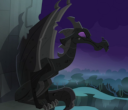
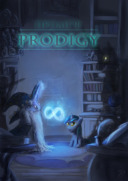
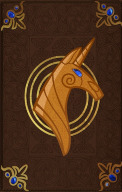


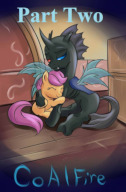
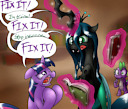

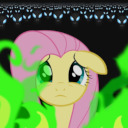
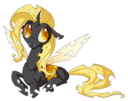




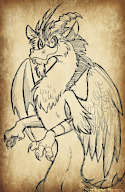

>Epilogue
Oh shit it's complete.
Now I have to read it.
And so this curious story comes to an end...
From some perspectives a happy one, somewhat shockingly.
Now... why would the author place the conclusion at a scene like that - the beach, the vultures, a simple choice?
Surely, from this chapter, we can tell this author knew about the events afterwards and understood how to best present this tale.
So, why place the conclusion on the fine border of a downer ending - a conclusion deprived of narrative finality - if there was a more satisfying conclusion in the epilogue?
I cannot come to my own conclusion about this fiction. There was so much to absorb, to learn from that alien voice and his perspective. His emotions came through the language like they had been forged and built up from each phrase and punctuation. And in the process of despising the way he framed his actions yet loving every skewed reflection he had, I got to know Errenax, purely through his use of language.
Truly, and admittedly, he who can use language to allow others to see through him is deserving of nothing short of respect.
A very, fitting ending, in many aspects.
So much is said, yet, everything as a reader, a listener, and one bound in this curious tale..
Is in the subjunctive.
I loved this story!
...I mean I didn't understand half of it.
But the worlds looked nice!
From what I could gather I enjoyed very much. I guess I need to go beef up my vocabulary and then come back and see if everything makes sense on the second read through.
Good work, and good luck on whatever you do next!
So... so beautiful...
I...
5258764 It's a great story, and yes, while being very verbose.
The story is much more how you interpret it. Everyone sees everything differently, and this was written in such a fashion to give no two folks the same view.
It was a well told story, all things considered. But, still I can't resist a feeling of melancholy now at the end. Please consider adding a 'sad'-tag to this, so others like myself will know what is in store for them.
5267905
Agreement. This story came this close to needing the [Tragedy] tag, and carries one hell of a downer before the epilogue. But it ends on a happy note. Love lost and regained. A new beginning. A place to be accepted after so much running...
Loved this story. But yeah, I also think it needs a new tag.
It also needs the Purple Unicorn Syndrome tag
The chapter names are all concerning grammar. Hmm. My inner Grammar Nazi tells me I'm going to like this.
The first part of the story was great, the description of cultural difference via language was an excellent idea well realized. You even made me question whether I was really fluent in English (a foreign language to me) with your paragraph describing fluency !
The second part, however... was not. To be honest, I found it awful. It was confusingly written for the sake of confusion, nothing was ever clear, the characters really make stupid decision that they then give up a mere paragraph later... It was obscure because "IMMA PUT OBSCURE THINGs BECAUSE FAMOUS WRITERS DO", and it fell flat. A shame after such a promising start !
5324223 Ah, thanks for clearing that up. The use of the subjunctive within the changeling language is intriguing. In fact, I tried searching up a language that uses primarily the subjunctive to see how that'll work. Unfortunately, no language in use seems to have that condition. And for a good reason - I'd assume the concrete is what humans naturally and instinctively notice before abstract notions.
This was delightful. Just when you think you know where it's going to go ("oh, so this is a Fluttershy hurt/comfort fic"), it turns around and flies off with your expectations and puts them in a cocoon to eat later.
It almost doesn't need the epilogue, but I was happy it's there, sucker that I am.
I guess the major unexplained angle to me is why the changelings back home went bye bye. Was it that after they left the unfit and vulnerable behind something found them ripe for conquest? Did they simply starve?! That's rather awful.
Wow, glad I finally got around to finishing this.
That final chapter, as though the author here was talking to his readers, but then the parts in the library, and the changing of tone and tense, and I reread the first part of the epilogue and understood.
*slow, long, applause*
This was an excellent example of a classic tragic hero. You have created an incredibly 3 dimensional character, hitting every note that was needed, and some more on top of that.
I applaud this.
This needs a tragedy tag.
4979452
Because English does not use the subjunctive as much as Latin did. Not because of any fundamental difference in the kind of things the speakers have to say, or any amount of education or erudition, but just the way the language is now structured.
The subjunctive in English, once much more common and versatile, has, with a few exceptions, slowly been replaced with constructions that use modal verbs: can, could, would, should, may, might, must, etc.
You still find remnants of the older usage in certain stock phrases, e.g., "long live the king" - that is, "may the king live long."
The only surviving modern English subjunctives, aside from stock phrases, are for hypotheticals and wishes (If I were a unicorn, I wish I were a unicorn) and certain kinds of demands or requests (I would insist that he teach me magic). (Some linguists will argue over whether the first usage is actually a proper subjunctive, or a distinct irrealis mood, but that's not really relevant.)
Even these uses are often dropped in informal speech. It wouldn't surprise me, in a century or so, to find no trace of a distinct subjunctive mood in English at all. Deliberate archaicisms notwithstanding.
Well, this was something different. Impressive and very welcome examination of and play with language, unique characterization, unorthodox composition (almost but not quote a memoir)... Mostly good!
Two things that really got me into this story beyond its intriguing premise were how it addressed obvious but often-overlooked peculiarities of language and (unfortunately episodic) stellar descriptions. The scene painted during the first flight across the water was absolutely gripping, for instance. The examination of how words work, how they are used, &c. were also very compelling, as they struck me rather on a personal level.
There were a couple curiosities that may or may not have detracted, however. First and foremost were the occasionally over-muddled sequences of events, most notably the scenes surrounding the escape from the train -- while the event itself was no doubt very perplexing, the nature of the writing suggests that it should be viewed through the lens of time and distance. Related is how the story is mostly presented as a memoir, but also contains scenes (Nadir and Flask, e.g.) where our supposed narrator could not experience the events displayed. This ties into the other major point of possible contention, in that the story defied most categorization of story arc, with characters being introduced late and possessing of a dubious through-line of action (but not character).
The epilogue also takes an odd turn, first taking a further turn to confusion, then redeeming a tragedy and giving the reader (at any rate) closure to the tale in a way that it wholly deserved.
All in all, mixed feelings, but the positive win out by a significant margin… I am glad to have spent time absorbing this tale.
Integral Archer,
Upon finishing this story I felt much the same after finishing Alex Garland's the Beach: Emotionally wrought.
You've created a great article of literature and I'm grateful to have read it.
Oh, and thanks for the epilogue.

5369805
I think they did.
I suspect Errenax's failure to notice his hunger was not truly something unique to himself, but an aspect of his species; ignoring discomfort and hunger while performing their tasks, only to realise their predicament too late with a frenetic search for food resulting.
And this seems to be supported by the scout that Errenax met when he returned home as well as his own behaviour on the ship.
7622559 dark does not automatically mean death. It could be a lot of different elements such as copious amounts of evil or more mature and downtrodden feelings that makes the reader feel bad.
7622559 It's been... about two years (I think) since I read this, so I don't recall anything like that, but yes, that would definitely merit a dark tag. Suppose I'll have to give the whole thing that a re-read.
On a more personal note, thanks for writing a story that stuck with me enough to spur my own desire to write.
This was weird in the most bizarrely fascinating way. It definitely needs a sad or tragedy tag though.
It was a really nice story, I am not a native english speaker and like that struggled with some words and some of the ways something was said. I think a sad tag would be fitting but it was still overall a happy end at least in my opinion. I think Fluttershy was in the later chapters represented a little bit to Cold-hearted, i mean they did drown this changeling and nothing was mentioned of her, or she just flew away later at the first possible moment after she was free. In retrospect besides of the treatment she gave him at the beginning of their meeting, she didn`t really got any importance later.
But that is just my opinioun.
It isn't just schadenfreude that made me wish he'd died. <.< Though there's a lot of that, too.
I'm sorry to say, I can't remember the last time I spent so long being so disappointed by a story. You started to regain my good graces there at the end, but this final chapter is cloying and reminds me of all the things I disliked during the journey.
And now I have the unenviable task of explaining to everyone why I feel that way. -.-
Review's up. Sorry it couldn't be better. :/
curious. definitely purple, though in a sorta rambling lecturer friend way.
And done. Only took me 7 years.
The story is pretty bad, but the style of writing very rare and difficult to pull off so I heavily applaud its use. Someone with an interest in classical literature would probably get a kick out of this.